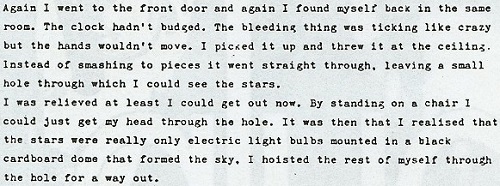Glass (Mark Goodier Session, 1992)
Your Sister’s Clothes (The Sisters EP, 1994)
Your Sister’s Clothes at Pulpwiki
“Your Sister’s Clothes” features the sisters from “Babies” four years on. Now the younger sibling finally gets her revenge for earlier years. – original sleeve notes
If the story of Babies was impossible to fully unravel, then what hope is there for Your Sister’s Clothes, the supposed sequel, where contradiction and opacity are spun out into a series of overheard conversations? Some would say ‘not much’, I suppose. I’ll try to get to analysis at some point, but once again it’s sort of a side issue. The headline here is that Pulp have finished trying to recapture that spark and have instead bottled up something far rarer – a little bit of magic that works entirely on its own terms, sounding at once emblematic of its era and notably unlike anything else the group recorded.
The genesis of the song came once again from experiments on the equipment the group suddenly found themselves owning or having access to – in this case a keyboard effect which (according to now almost-member Mark Webber) sounded like composer Philip Glass. And it really does, too, at least like that repetitive interlaced piano work which seems the most memorable part of his music for non-experts like me (listen to this for a minute or two if you aren’t sure what I mean). In the finished version, released two years later on the near-flawless Sisters EP this line works almost subliminally, but once you’ve spotted it, it’s remarkably difficult to un-hear. It’s integral to the structure, but enough other layers are woven into it that you could easily miss it.
The other important feature of the early version of ‘Glass’ recorded for the Mark Goodier session is Russell’s violin. Experimental music being right up his street, he joins the minimalist party with a violin performance so aggressive it’s bordering on the psychotic – it sounds, in fact, like he’s picking a fight with the rest of the song. Instead of joining in with the repetition he’s constantly pulling it apart, imitating it, shoving it sideways. It’s not exactly what you’d call virtuoso, but it works, completely, to the extent that it’s hard to imagine how it would work without it – but of course it does.
Two years later, the song re-named ‘Your Sister’s Clothes’, Ed Buller again managed to remove all traces of Russell’s improvisation from the song. Or perhaps he didn’t – Nick Banks seems to suggest that it was all Russell’s doing, using a varispeed to warp his violin until it sounded almost like another line of synths. Buller was busy elsewhere, though, the chance to produce Pulp-meets-Modernism being exactly what he was born to do. Candida’s keyboards are piled up, layer after layer, all cascading and chiming in complex but deeply satisfying patterns. The first, most dominant keyboard line is the strangest of all, especially when removed from the rest, sounding like a night-time level of an early 90s Sega game. Then there’s the drums, thumping and rolling like Magnus had never left. Earlier versions had a lurch, a sudden shift in tempo when reaching the chorus. This is lost in the final mix, but it’s not a huge shame, such is the hypnotic, sickly fever-dream power of the thing.
This is the important stuff, then, not so much the lyrics, which are as difficult to nail down, meaningfully, as their prequel. What is this woman getting revenge for, her sister sleeping with Jarvis? When Jarvis is the narrator? If serious, this would seem egotistical, but the title and the topic being little more than a pretence or a theme, it doesn’t really matter. Pointing out these narratives is a neat bit of misdirection – “don’t read the lyrics while listening to the recording” – so we get a title, a brief cue and a list of impressions, vividly memorable lines, opportunities for vocal experimentation – the way he sings “todaaaaaaayyyyaaaayyyyheyhey!” is twisted in just the right, completely unexpected way. That’s more than enough, surely.







